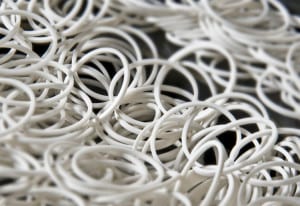PTFE (polytetrafluorethylene: trade names Teflon, Dyneon, Hostaflon or Fluon) has the properties described below:
Nearly universal chemical resistance
Extremely high bonding forces between the fluorine and carbon atoms in the molecule chain make this material resistant to corrosion by nearly all media, elementary fluorine being one of the few exceptions here. A list of the media to which PTFE and PTFE compounds are resistant can be found here.
High temperature resistance
Continuous operating temperatures of -250°C to +260°C (without mechanical stress).
Excellent sliding properties
The friction coefficients in the static and dynamic ranges are nearly identical. This eliminates the undesirable “stick-slip” effect which leads to a surge in breakaway torque during system start. Side effect: Parts made of PTFE can be cleaned easily because nothing sticks to them.
Very good insulation
PTFE provides superior insulation compared with most other plastics, especially in the high-frequency (ultrasonic) range. Pure PTFE has a specific insulation resistance of 1018Ohm * cm.
Water absorption
PTFE is almost fully impermeable to water; values of less than 0.01% have been measured in tests. Some of its mechanical properties are listed in this table.
But it gets even better:
If pure (virgin) PTFE does not meet your high demands, it can be tailored to your application through an addition of filler. Refer to: PTFE compounds.

